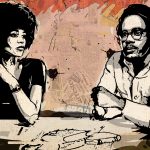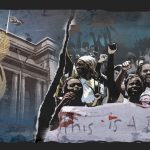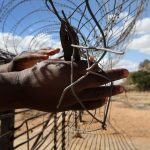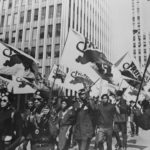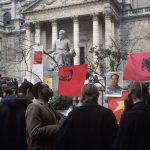Caribbean revolutionary movements and 1968
Though Caribbean leftists are less spectacular today than in the decade that produced Walter Rodney, there is a growing groundswell in feminist and LGBTI communities.
Author:
28 January 2019

Question: For many, 1968 is a year that seemed to swell with the aspirations and accumulated political gains for left political projects of the decades that preceded it. The Rodney Affair is often cited as the “68 protest event” of the Caribbean. Could you elaborate on what happened and what was at stake?
Aaron Kamugisha: 1968 is a year of great importance for the Anglophone Caribbean left, as it is widely seen as having ushered in a period of heightened revolutionary activity, which came to an end with the collapse of the Grenada revolution in 1983. In 1968, Jamaica had been independent for less than a decade, but already discontent with the postcolonial order was manifest in the actions of Garveyites and radical trade unionists of an earlier generation, including the Coral Gardens incident of 1963 and anti-Chinese riots of 1965, culminating in a national state of emergency from 1966-1967.
Into this political moment strode Walter Rodney. Rodney had completed his undergraduate History degree at the University of the West Indies (UWI), Mona Campus in 1963, and had gone onwards to the School of Oriental and African Studies at the University of London where he became the first West Indian to receive a degree in African History in 1966. Following a short stint in Tanzania (he was later to return from 1969 to 1974 following his time in Jamaica), he came to Jamaica in January 1968 to take up a post as a lecturer in African History, the first person appointed by the UWI to a post in that discipline.
Rodney was a tremendous scholar, a gifted orator, and possessed a unique blend of human sympathy and charisma which made him popular both on campus and in impoverished communities in Kingston. His conviction that the knowledge he gained in Western universities should be put to the service of the everyday people he met, which he later termed “guerrilla intellectualism”, led him to share ideas, or in Jamaican parlance “ground”, with the masses, particularly the Rastafari, the most despised part of the population, and consequently he was far more active outside of the campus than on it.
Related article:
The Jamaican state, we now know, had been watching Rodney since his time as an undergraduate student (1960-1963), due to his visit to Cuba during these years, and had identified him as a subversive element from that time. In many ways, Rodney could not have chosen a better time to enter the Jamaican arena. He entered a country in which popular discontent with the first postcolonial administration was on the rise, but also a place in which the entire community was transfixed by the global events of 1968, one of the most disorderly years of the 20th century.
The assassination of Martin Luther King Jr and the hangings of anti-colonial freedom fighters in the then Rhodesia are specifically mentioned by him in one of his speeches as central to the formation of a new consciousness around blackness on campus. At what was perceived to be an elitist institution largely attended by the Caribbean middle classes, even largely apolitical students were reflecting on the question of their blackness, while there was also a noteworthy radicalised middle-class intelligentsia on campus. It was a historical conjuncture Rodney could not create, but he was perfectly poised to exploit.
In October 1968, Rodney travelled to Montreal to attend the Congress of Black Writers conference, a landmark event African-Canadian intellectual historian David Austin has chronicled well. On his return to Jamaica on 15 October, he was refused entry – the authorities informed him he was banned from entering the country, and he was not allowed to disembark the plane.
When news of this reached the university, students decided to organise a peaceful demonstration to the capital Kingston on 16 October, to protest this decision and show their solidarity with Rodney. The intent of this march was far from confrontational – indeed many students wore their official university gowns, as a sign both of class and privilege, and originally, the students had decided to hire buses to take them to the offices of the prime minister to register their complaint.
Related article:
When the buses did not arrive, they decided to walk to town. The march was joined by urban youth and met with police repression which resulted in a series of confrontations that resulted in violence, the destruction of property and at least two deaths. The students, who had retreated quickly back to the campus when met with tear gas and beatings from the police, awoke the next day to find the entire campus surrounded by the Jamaican defense force, a state of siege which would last for 10 days.
In the parliamentary debate that followed, Rodney was vilified as the greatest current threat to national security in the country, a communist sympathiser who was bent on the overthrow of the government. The siege of the UWI (never total, as persons were allowed to exit and enter) was finally lifted, after a point in which people seriously thought that the university might have been closed by the government.
The Jamaican government had targeted university academics before, but the sheer slander poured upon Rodney and the extent of state violence towards both the students and the urban youth made this an event unforgettable. It sharpened the critique of the neocolonial state already underway, and directly led to the emergence of the journal Abeng, the most important left journal in Jamaica of this period. Many of the students who were at Mona never forgot their experience as part of the Rodney affair, and went on to participate in radical activity within their own countries.
Related article:
Independently of the Rodney affair, but with sympathies to it, a black power movement would emerge in Trinidad that would culminate in the February 1970 insurrection, in which the government of Eric Williams was nearly toppled. Throughout the Anglophone Caribbean, radical newspapers and movements appeared in the 1970s, along with Marxist parties, most notably the Working People’s Alliance (WPA) in Guyana and the Worker’s Party of Jamaica (WPJ). The best place to understand the complex nature of the politics and personal dynamics present in these movements are the series of interviews that David Scott has done in the journal Small Axe with key persons, particularly his interviews with Rupert Lewis, Andaiye and Robert Hill.
The most important event in the revolutionary Anglophone Caribbean was, of course, the Grenada Revolution, which lasted four years from 1979 to 1983. Grenada became a Caribbean-wide event, in which activists throughout the region came to work and give support. It was the most critical stand made by the region’s leftists against empire of the period and the tragedy of its collapse was a shattering event for the left and signalled the demise of radical projects aimed at capturing state power throughout the region.
Today’s revolution
Q: What kind of legacy remains of the radical movements of the 1960s today?
Kamugisha: When you posed this question, I was tempted to reply with a sigh, “It’s all over now.” That reply does capture a dominant trend the left does feel in the contemporary Anglophone Caribbean – that the revolutionary striving of those 15 years has vanished, with no clear signs of their resuscitation in the near future. It’s a view, though, which has definitive limits.
The end of the Grenada revolution was without doubt a cataclysmic, traumatic event for the Caribbean left, not so much because of the United States invasion and the vulgarity of its imperial lies which were to be expected, but the prior internal fratricide, in which previous comrades turned on each other with deadly consequences. This implosion poisoned a generation against socialism.
It also came at the beginning of a decade of structural adjustment, which also saw the advent of neoliberalism with the electoral success of Margaret Thatcher and Ronald Reagan and the collapse of the Soviet Union, all of which fatally undermined efforts to fashion new Caribbean socialist futures. Indeed, the steady retreat to the right of Caribbean state managers is such that technocratic neoliberal elites, who would have been denounced in the 1970s as part of what Rodney called the comprador bourgeoisie of the region, are today advanced as pragmatic examples of “good governance” by the very persons who formed much of the leftist vanguard in the past.
Related article:
This kind of cooptation by the left is not unique to the Caribbean, but is perhaps doubly difficult here given the exceedingly small size of the countries, and the corresponding ability of the governing elites to deny recalcitrant leftists any kind of labour opportunities in the country of their birth – most famously done by the Burnham regime in Guyana to Walter Rodney, before his assassination. Jobs can be denied, professional advancement stymied, rumours engineered and personal lives destroyed leaving Caribbean citizens to respond to this in the manner they always have – they simply leave the region.
It is, though, as I alluded to earlier, an error to view the Caribbean left’s history as a tale of decline since 1983. In the past three decades, the most discerning interventions in the quest for human freedom beyond coloniality have come through the work of Caribbean feminist thinkers, who have fundamentally transformed our conversations about citizenship, the law, lived experience and intersubjective relations, and revised the conditions of possibility through which Caribbean people conceive of their belonging and citizenship within their nation-states.
This transformation is routinely missed by both the Pan-Africanists and leftists of a generation who still hold on to a very narrowly conceived view of Caribbean social and political transformation. (I am talking of the type who will blithely speak of “the Caribbean man and his woman” or suggest that “our womanfolk” need to caucus among themselves as part of the movement forward).
Related article:
The LGBTI movement in the region, has also been doing some salutary work, challenging both the antiquated colonial laws that criminalise same-sex relations with major victories in the last year, and the long and difficult work of changing hearts and minds about sexual difference and the rights of citizens. The tremendous importance of these movements cannot be understated, as they are fundamental to the transformation of the very coloniality of citizenship which diminishes the lives of so many people in the region.
Having said this, the absence of socialist or Marxist parties in the Anglophone Caribbean is striking, as are the timid and regime-affirming stances of most of the trade unions. It is not that one believes that the social transformation that the Caribbean so desperately needs will be easy, but the almost complete absence of even a publicly advocated, minority radical alternative is as striking as it is disconcerting.
One of the unarguable positive features of the socialist groups of the 1970s was their willingness to serve as the umbrella group for so many different causes, and to debate anything which served the agenda of progressive social change – a feature which I find somewhat missing in some of the stances taken by contemporary youth activists, who tend to serve and seem interested in only one delimited cause.
Given the fact that new questions barely remarked in the past – particularly the environmental question, which has placed Caribbean countries on the frontline of global climate change – are so pressing, and the implications of stumbling along (as we currently are) so dire, it may well be that we will soon see the emergence of new social movements unburdened by the legacy of the recent past.
This is the third in a series of five articles that examine how protests and ideas generated in 1968 changed the political, social and educational contours of the world.
Part one:
Part two:
Part four:
Part five:
This is an edited excerpt from a longer interview first published by Thread.

